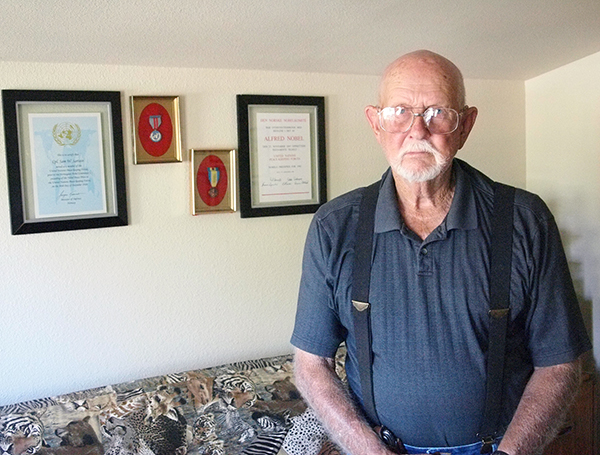Veteran Sam Sartain still fighting so Americans remember Korean War

DANIEL CLIFTON • PICAYUNE EDITOR
BUCHANAN DAM — Even though he finds it difficult to talk about his time on the Korean peninsula from 1951 to 1952, Army veteran Sam Sartain shares some of those painful experiences for one reason.
“I want people to know what we did, and that we fought in a war,” Sartain, 86, said. “At the time, they called it a ‘police action.’ I don’t really know what that means. For us, it was a war.”
Squashed between World War II and the Vietnam War, the Korean War lost its place in much of the nation’s collective memory and is often called “America’s Forgotten War.” Sartain and other Korean veterans are trying to remedy that through veterans organizations and other ways.
“We’re just trying to let Americans know about the war,” Sartain said.
The Korean War, fought from June 1950 to July 1953, thrusted thousands of American men into combat — some once again and others for the first time. The war started when the North Korean military, backed by the then-Soviet Union and Communist China, invaded South Korea.
“The South Koreans didn’t stand much of a chance,” Sartain said. “They just had a rag-tag army at the time.”
The United States has occupied part of South Korea since World War II as a way to help the country recover from both the war and a long period of Japanese occupation. But, at the time, there wasn’t enough of an American presence to deter the attack. Soon, the North Korean military held the rest of the peninsula.
In response to the sudden attack, both the United States and the young United Nations stepped in.
Just as things were beginning to heat up in Korea, Sartain was heading home after serving in the Army as a part of the occupational force in Japan after World War II. He left the Army in the early summer of 1950, but, once he realized what was happening in Korea, he rejoined a few months later.
The young soldier became a member of the 31st Infantry Regiment as part of a 57-mm recoilless rifle team. He landed in Korea in June 1951. While his unit was an American outfit, it served as part of the U.N. peacekeeping forces — though Sartain’s stint in Korea was anything but peaceful.
Soon after the war broke out and the United States military became involved, the Americans and the Republic of Korea army, along with the other allies, pushed the invading North Korean forces back north toward the 38th parallel.
When Sartain arrived, his unit was assigned to heavy mountain fighting in the area.
“Where we were, we fought in the mountains,” he said. “If the North Koreans were up on a hill, we went up and knocked them off. If we were up on a hill, they came up and tried to knock us off. It was some of the most intense fighting in the 21st century.”
He recalled his unit settling in Thanksgiving eve off the line for a holiday meal. But it didn’t last. A North Korean advance forced a South Korean unit off a nearby hill, so Sartain and his buddies found themselves slugging their way back up that hill Thanksgiving day.
“Instead of a good Thanksgiving dinner, we had C rations,” he said.
The winter months in the Korean mountains had the soldiers battling more than one enemy.
“We had two enemies over there,” Sartain said. “We had the weather, and we had the bullets.”
Though not as long as the Vietnam War, the cost was almost as high in American lives. In 2000, the Department of Defense stated about 37,000 Americans lost their lives on the Korean peninsula during the war. Some were non-combat deaths.
The toll was even higher for the Koreans and the Chinese, who fought on the North Korean side. Historians believe between 500,000 and 600,000 Koreans — both troops and civilians — died in the war, while estimates range as high as a million Chinese lives lost.
“It was a war,” Sartain said.
Sartain rotated out of Korea in May 1952 after almost a full year on the peninsula.
“I probably spent 250 days in combat,” he recalled. The Korean War itself waged for another year until an armistice agreement in July 1953 brought an end to the conflict. The Korean peninsula remains divided at the 38th parallel, and it’s sometimes an uneasy peace.
While many Americans have little or no knowledge of the Korean War, Sartain said the South Koreans to this day are extremely grateful for the American involvement.
“We’ve given them 60 years of peace and prosperity,” he said.
While hostilities ceased 60 years ago, the effects of the war linger. In 2012, the remains of 30 American service members killed in Korea were returned to the United States.
“And there are probably still more over there,” Sartain said. “I don’t know if we’ll ever get them all back.”
In 1988, officials awarded the Nobel Peace Prize to the U.N. peacekeeping forces of the Korean War. Sartain is part of the group honored. A certificate and a Nobel medal hang in the upstairs office of his Buchanan Dam home.
“Not every American who served over there got one,” he said. “I thought we all did, but it was only those units that were part of the U.N. forces.”
While the Nobel Peace Prize offers him some comfort, Sartain said he’s not giving up on educating Americans about the Korean War and the U.S. service members who fought in it.
“I just want Americans to know about it and that we were there,” he said. “It’s called the ‘Forgotten War,’ but I don’t want it forgotten. I don’t want the men who went over there forgotten. They deserve better.”
daniel@thepicayune.com

